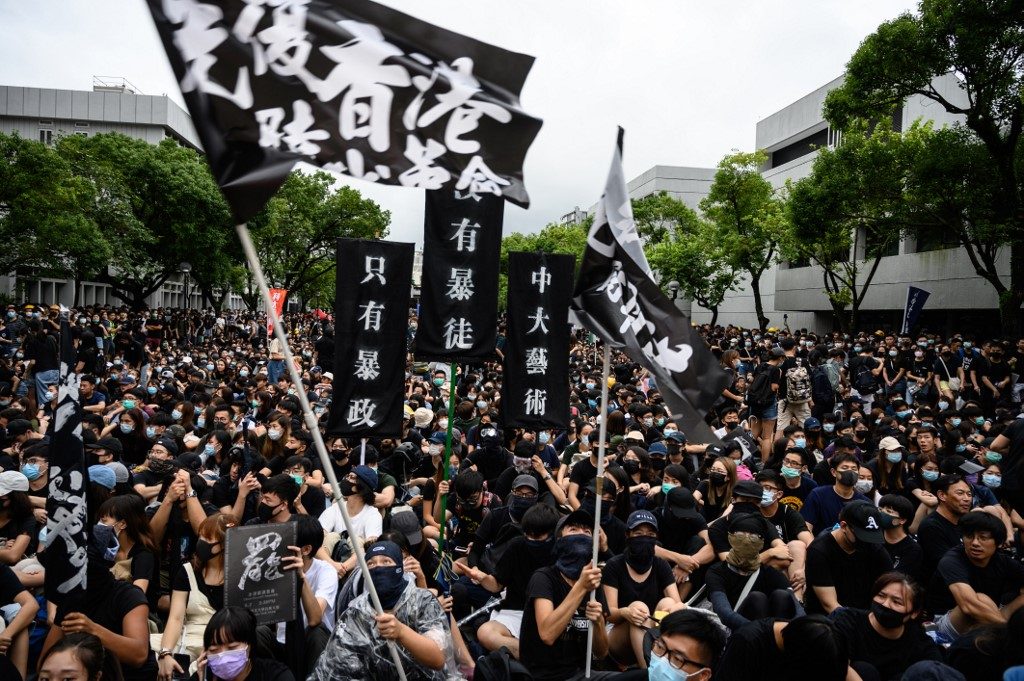SUMMARY
This is AI generated summarization, which may have errors. For context, always refer to the full article.

HONG KONG, China – China’s semi-autonomous city of Hong Kong has been rocked since April by protests that were sparked by a proposed extradition law, which its leader said on Wednesday, September 4, will be withdrawn.
The increasingly violent protests have broadened into wider demands for democratic reform.
Here is a summary:
Thousands on the streets
On April 28 tens of thousands of people march peacefully against a Hong Kong government bill that would allow, for the first time, extradition to mainland China.
There are fears the law will tighten Beijing’s grip on civil society.
Violence erupts
Despite government tweaks to soften the law, more than one million people, according to organizers, protest again on June 9.
(READ: Why is Hong Kong’s China extradition plan so controversial?)
The demonstration is the biggest since the 1997 handover of the former British colony to China.
It descends into violence when police try to disperse small groups of protesters who hurl bottles and use metal barricades.
(READ: Chinese media blames Hong Kong demonstrations on collusion with West)
On June 12, 79 people are injured in the worst clashes since the handover. One protestor dies falling from a roof.
(READ: Leaderless and livid: The youngsters on Hong Kong front lines)
Two million protesters
Hong Kong leader Carrie Lam postpones the bill on June 15 but a fresh demonstration the next day calls for its full withdrawal.
Organizers say two million people take part.
(READ: Q and A: One umbrella, one movement against China extradition)
On July 1, the anniversary of Hong Kong’s return to China, hundreds of protesters smash their way into parliament and ransack the building.
(READ: ‘One country, two systems’: Hong Kong’s special status)
On July 9 Lam says the extradition bill “is dead”.
Authorities get tough
On July 21 in the Yuen Long area, suspected triad gangsters attack protesters inside a metro station.
On July 27-28 there are clashes between police and pro-democracy protesters following banned demonstrations.
The local authorities and Beijing toughen their stance, and dozens are arrested.
On August 5 a city-wide strike causes chaos, disrupting public transport and air links.
For a third consecutive night, police confront protesters.
(READ: Pro-democracy, anti-repression: Hong Kong protests since 1997)
On August 6 China warns “those who play with fire will perish by it”.
Airport chaos
Hong Kong’s airport cancels flights on August 12 after being invaded by thousands of black-clad protesters.
(READ: IN PHOTOS: Sea of black at Hong Kong airport protest)
On August 15 thousands of Chinese military personnel parade at a stadium in Shenzhen, a city across the border.
(READ: Young, educated, and furious: A survey of Hong Kong’s protesters)
On the 18th, some 1.7 million people march peacefully through the streets, according to organizers.
US President Donald Trump warns China that carrying out a Tiananmen Square-style crackdown would harm ongoing talks on a trade accord.
The next day, Twitter and Facebook accuse China of using the social media platforms against the pro-democracy protests.
Arrests
On August 25 police raise the stakes, using water cannon and a warning shot.
On the 27th, after G7 leaders call for calm, Beijing accuses the group of “meddling”.
On August 30, several prominent democracy activists are arrested. More than 1,000 people have been arrested since June.
On August 31 tens of thousands of people march through the streets in an unsanctioned rally. Hardcore demonstrators hurl petrol bombs and police fire tear gas and deploy water cannon, before making mass arrests inside metro stations.
Extradition law shelved
On September 4, Lam says the extradition bill will be withdrawn.
“Too little, too late,” prominent activist Joshua Wong says.
Protesters are also demanding that Hong Kongers be able to directly elect their leaders and an independent inquiry into alleged police brutality. – Rappler.com
Add a comment
How does this make you feel?
There are no comments yet. Add your comment to start the conversation.